#franco fabrizi
Explore tagged Tumblr posts
Text

Le sorprese dell'amore, 1959
#Le sorprese dell'amore#1959#Surprise of Love#Luigi Comencini#Sylva Koscina#Maria Luisa Mangini#Dorian Gray (actress)#Franco Fabrizi#Walter Chiari#movie scene#50s#1950s#1950s movie#50s movie#fifties#fifties movie#classic movie#1950s film#gif#50s gif#1950s gif#movie gif#moviegif#movie#italian actress#italian movie#italian cinema#Italy#black and white movie#b&w
9 notes
·
View notes
Text
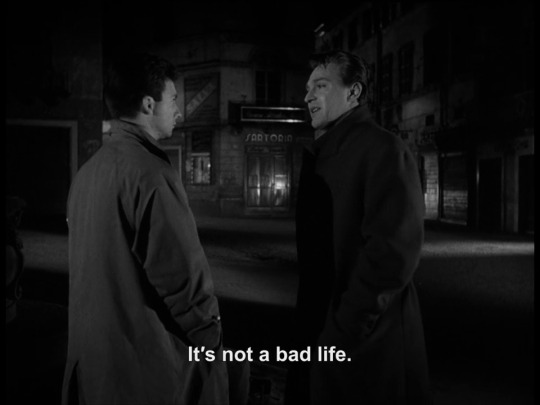
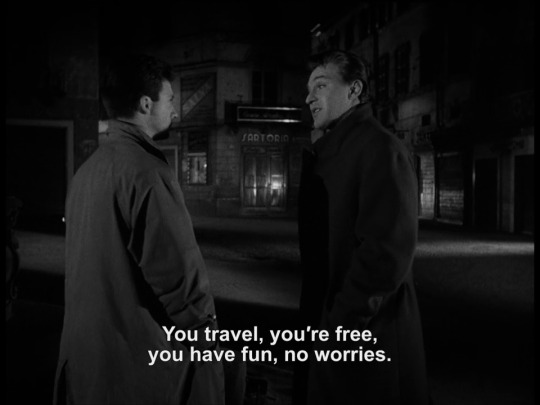
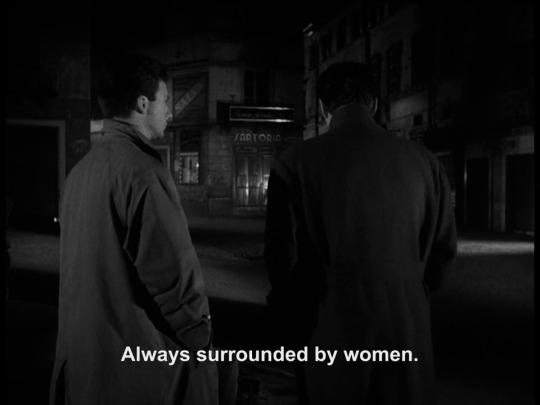
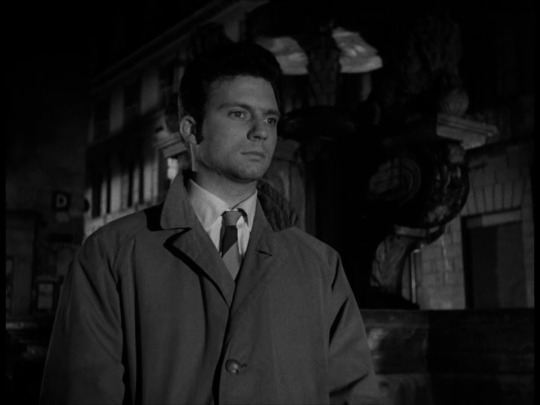

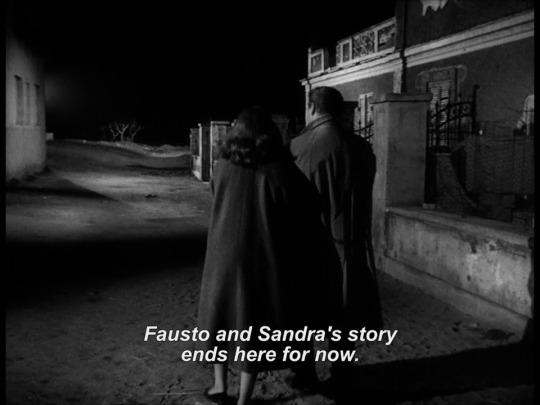
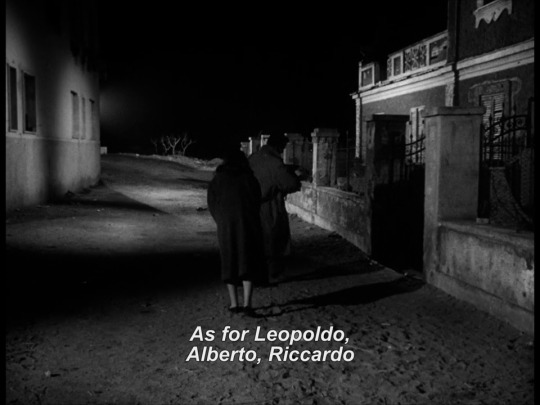
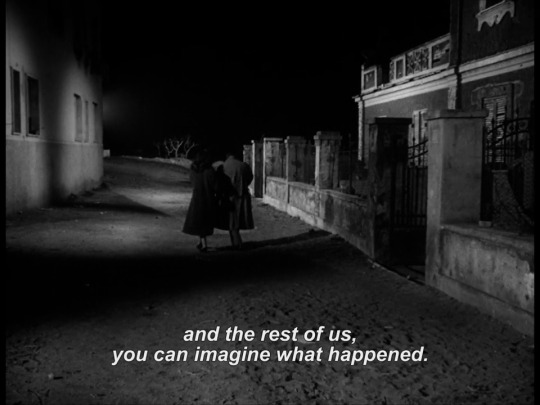
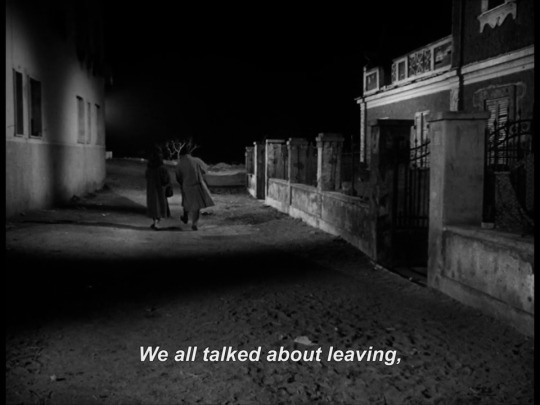
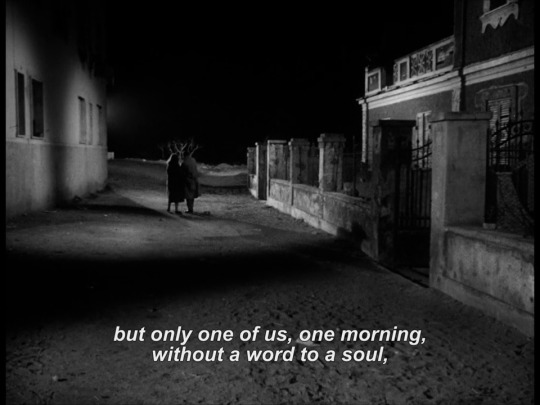
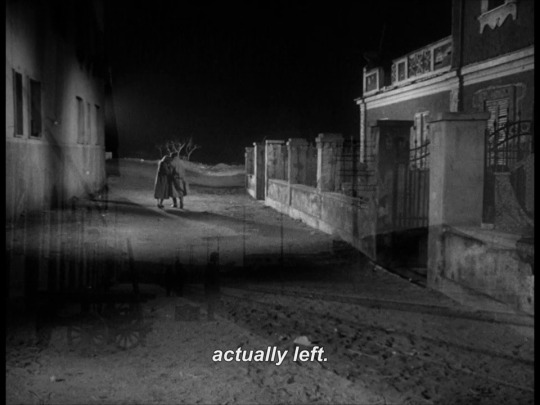
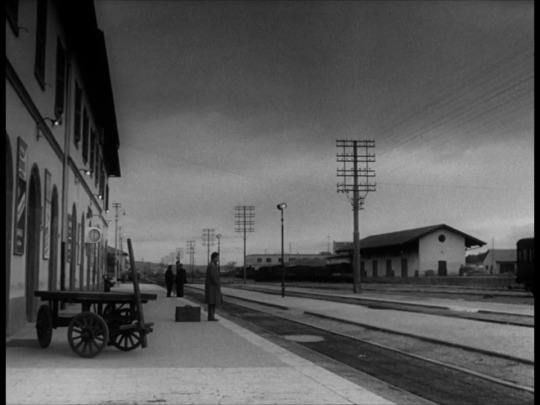
I vitelloni, 1953
#comedy#drama#i vitelloni#the young and the passionate#federico fellini#ennio flaiano#tullio pinelli#franco fabrizi#leonora ruffo#franco interlenghi#journey
12 notes
·
View notes
Photo

#the italian connection#henry silva#woody strode#mario adorf#adolfo celi#luciana paluzzi#franco fabrizi#femi benussi#gianni macchia#F. Romana Coluzzi#cyril cusack#sylva koscina#fernando di leo#1972
16 notes
·
View notes
Photo

Michelangelo Antonioni’s “Le Amiche” September 7, 1955.
#Michelangelo Antonioni#Le Amiche#1955#Fifties#Foreign#🇮🇹#Drama#Eleonora Rossi Drago#Yvonne Furneaux#Madeleine Fischer#Gabriele Ferzetti#Franco Fabrizi#3/5
3 notes
·
View notes
Text
Killer Cop (1975)
Killer Cop (1975) is hardly a fun jaunt, however, it’s an intriguing police procedural with an interesting collection of characters at its heart.
#Arthur Kennedy#Bruno Zanin#Claudio Cassinelli#Franco Fabrizi#Giuliana Cianfriglia#Killer Cop#La polizia ha le mani legate#Sara Sperati
0 notes
Text
18 ottobre … ricordiamo …
18 ottobre … ricordiamo … #semprevivineiricordi #nomidaricordare #personaggiimportanti #perfettamentechic
2022: Robert Gordon, cantante, musicista e attore statunitense. All’età di nove anni, fu fortemente ispirato dalla canzone di Elvis Presley ” Heartbreak Hotel ” trasmessa alla radio e decise di intraprendere la carriera di musicista rock and roll già in giovane età. Gordon fece il suo debutto discografico all’età di 17 anni nel 1964 con un gruppo chiamato Confidentials. All’età di 19 anni si…

View On WordPress
#18 ottobre#Alfredo Cerruti#Barbara Karinska#Bill Lucking#Conchita Montes#Consuelo Crespi#Consuelo Pauline O&039;Brien O&039;Connor Crespi#Crane Wilbur#Elizabeth Arden#Enrico Cucuzza#Enrico Luzi#Enrico Luzzi#Erwin Crane Wilbur#Federica Cavenati#Florence Nightingale Graham#Francesco Fabbrizzi#Franco Fabrizi#Gayle Peck#Gwen Verdon#Gwenyth Evelyn “Gwen” Verdon#Italo Valentino Bisoglio#Jack Angel#Jo-Carroll Dennison#Jon-Erik Hexum#Julie London#Kikka Cavenati#Luisa Poselli#Maria de la Conception Caro#Miguel Ángel Palomera Gonzali#Miguel Palmer
0 notes
Text
LA POLIZIA HA LE MANI LEGATE - (Luciano Ercoli, 1975)

The movie (”Killer Cop”, in English) is an average generic movie (a “poliziottesco”, indeed) that, if not great under the strictly cinematic side, is nonetheless important to let the viewer someway breath the deadly air that spreaded Italy during the “years of lead”, the infamous season of the political terrorism. The fact that start the story happens in Milan, when a bomb explodes into a crowded hotel (with a clear reference to the “strage di Piazza Fontana”); some investigations bring commissioner Rolandi to discover the bomber, but someone "from above” puts a spoke in the wheel...
The movie has several political implications showing deviated secret services and hidden collusions in high places and because of that I can’t deprecate it but despite this courageous concern (and one o two good characterizations - I think of that one of Franco Fabrizi -) it is not enough to conceal the strong impression of traditional routine that shines through the direction and the acting (to not tell of the screenplay that is a real wreck...
r.m.
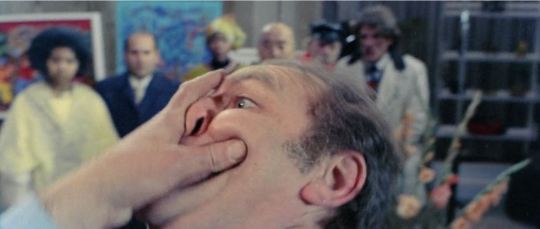



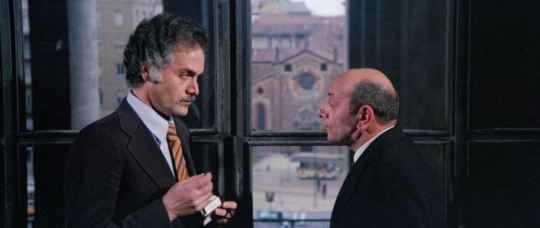




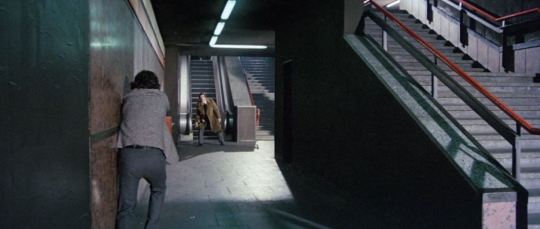


R.M.
0 notes
Photo
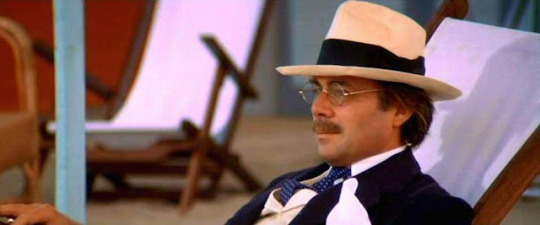
Dirk Bogarde in Death in Venice (Luchino Visconti, 1971)
Cast: Dirk Bogard, Björn Andrésen, Marisa Berenson, Mark Burns, Silvana Mangano, Romolo Valli, Nora Ricci, Leslie French, Franco Fabrizi. Screenplay: Luchino Visconti, Nicola Badalucco, based on a novel by Thomas Mann. Cinematography: Pasqualino De Santis. Art direction: Ferdinando Scarfiotti. Film editing: Ruggero Mastroianni.
I have nothing against slowness in movies if it leads to a satisfactorily immersive experience, but Death in Venice is just languorous, taking its own weary way toward the conclusion promised in the film's title. Watching it patiently has some rewards: Dirk Bogarde's fine performance as Gustave von Aschenbach; the sometimes opulent, sometimes melancholy views of Venice provided by Pasqualino De Santis's cinematography; the handsome sets by Ferdinando Scarfiotti and costumes by Piero Tosi; loving glimpses of Silvana Mangano as Tadzio's mother; and great gulps of Mahler's third and fifth symphonies on the soundtrack. But the screenplay by Visconti and Nicola Badalucco carries no intellectual or emotional weight. Thomas Mann's novella is meant to be savored and reflected upon, but film inevitably carries us along with our expectations of action, and there is little enough of it going on anywhere but in Aschenbach's head to provide Visconti with something to shoot. He resorts to flashbacks: to the illness that causes Aschenbach to take his fatal trip, to the happy days of Aschenbach's marriage (Marisa Berenson plays his wife) and the devastating death of their child, to a visit to a prostitute who plays Beethoven's Für Elise on the piano, to the storm of cheers and boos at the performance of Aschenbach's composition (actually an excerpt from the Mahler third symphony) and an argument with a friend (Mark Burns) about his music. The beautiful young Tadzio (Björn Andrésen) clearly represents something that has been lost from (or never present in) Aschenbach's life, But Visconti never makes Aschenbach's obsession with Tadzio either psychologically or thematically convincing. In the end we're left with little more than Aschenbach as the aging gay man doomed to a lonely death -- a too-familiar trope.
9 notes
·
View notes
Video
Silvana Pampanini by Truus, Bob & Jan too! Via Flickr: Franco-German card. Ufa, Berlin/ Editions P.I., Paris. Unitalia Film Silvana Pampanini (1925) is an Italian actress who knew enormous popularity in the 1950s and 1960s. In the early 1950s, before Sophia Loren e Gina Lollobrigida reached stardom, Pampanini was one of the most well-known symbols of Italian beauty. Born in Rome from a family that had moved there from the Veneto some three centuries ago, Silvana Pampanini got her law degree during the war and visited the Conservatory of Santa Cecilia where she got a degree in piano and song. As a singer, the young Pampanini made career within entertainment music, not only were her songs widespread on unique records, she even got an audience with pope Pio XII. Over the years she also was a frequent visitor of the opera seasons. Her cousin was the soprano Rosetta Pampanini. When war was over, her singing master inscribed her for the Miss Italia contest in Stresa in September 1946 which she won ex aequo with Rossana Martini, thanks to a fierce audience reaction after Martin had originally been chosen by the jury. Her Miss Italia title was her introduction to a career in cinema and from the film L’Apocalisse (Giuseppe Maria Scottese 1946) Pampanini performed in various films, often musicals. She became also the toast of weeklies and film magazines. Her father, who originally had been against his daughter having a career as actress, became her agent. Even if she was dubbed in her first roles Pampanini became a star, performing with all the great actors of postwar cinema: Totò, Peppino De Filippo, Alberto Sordi, Vittorio De Sica, Marcello Mastroianni, Nino Manfredi, Vittorio Gassman, Walter Chiari, Amedeo Nazzari, Renato Rascel, Raf Vallone, Nino Taranto, Massimo Girotti, Ugo Tognazzi, Carlo Dapporto, Paolo Stoppa, Rossano Brazzi, Massimo Serato, Folco Lulli, Aroldo Tieri, Carlo Campanini. Among her foreign film partners were Jean Gabin, Henri Vidal, Jean-Pierre Aumont, Raymond Pellegrin, Pierre Brasseur, Curd Jurgens, Pedro Armendariz and even Buster Keaton. In the 1950s Pampanini played in one film after another and many of her films were distributed worldwide. Well known was for instance the Dino de Laurentiis production I pompieri di Viggiù (Mario Mattoli 1949), which Ennio Flaiano considered rather a series of vaudeville acts than a film, and thus preceding TV vaudeville. With Quo vadis? parody OK Nerone (Mario Soldati 1951), Pampanini had her first international success as Empress Poppea, opposite Gino Cervi as Nero, and Walter Chiari and Carlo Campanini as two American sailors who dream they are in Nero’s Rome. In the romantic comedy Bellezze in bicicletta (Carlo Campogalliani 1951) she formed a pair with Delia Scala and sang one of the most beloved songs of the time: Bellezza in bicicletta. In 1952 Pampanini performed in the much awarded Processo alla città (Luigi Zampa), starring Amedeo Nazzari; La presidentessa (Pietro Germi), based on a French pochade; and La tratta delle bianche/White Slave Trade (Luigi Comencini). The latter also casted Eleonora Rossi-Drago, Tamara Lees and (in a smaller part) Sophia Loren, but the leading men Vittorio Gassman and Marc Lawrence both have set their eyes on Silvana. In 1953 Pampanini played in an episode of Un giorno in pretura (Steno) for which her makeup man transformed her in a lady 30 years older. That year she was also the title character Anna Zaccheo in Giuseppe de Santis’ Un marito per Anna Zaccheo, which costarred Nazzari and Massimo Girotti. In 1955 Pampanini performed in the comedy La bella di Roma by Luigi Comencini, which co-starred Alberto Sordi and Paolo Stoppa, and she played in the box office hit Racconti romani (Gianni Franciolini), based on a story by Alberto Moravia, and starring Franco Fabrizi. Finally Pampanini played in La strada lunga un anno (1958) by Giuseppe De Santis, an Italian-Yugoslavian coproduction, an Oscar candidate in 1959 and Golden Globe winner for best foreign picture. Even if she went to America, Pampanini refused to act in Hollywood, presumably as her English was not good enough, but she did play in France, where she was known as Niní Pampan. Examples are La tour de Nesle (Abel Gance 1955) in which she played Marguerite de Bourgogne opposite Pierre Brasseur as Jehan Buridan, and La loi des rues (Ralph Habib 1956), with Raymond Pellegrin. She also played in films in Spain, Germany, Greece, Yugoslavia, Egypt, Argentine, and in particular Mexico, where she played in some films that never were released in Italy, such as Sed de amor (Alfonso Corona Blake 1959) with Pedro Armendariz, and Napoleoncito (Gilberto Martinez Solares 1964). In the meantime the yellow press published flirts of Pampanini with prince Ahmad Shah Khan, Tyrone Power, William Holden, George DeWitt, Omar Sharif, Orson Welles, king Faruq of Egypt and others. Pampanini herself told how her one true love, a man ten years older than she, not involved in cinema and never identified, died of a disease one month before their wedding. After some short experience as director and screenwriter in 1958, Pampanini slowed down her film career and focused on radio and TV, where she worked as announcer and host of manifestations. In 1964 Dino Risi directed her in Il gaucho, a partly autobiographical film in which Silvana played a declining diva, who pathetically searches for her lost glory and for a millionaire to marry. In 1966, after twenty years of career, Pampanini quitted cinema in order to assist her aging parents whom she took care of till their death. She returned for one last role as a prostitute in an episode of Mazzabubù... Quante corna stanno quaggiù? (Mariano Laurenti 1971). After that she was only visible once more as herself in Tassinaro (1983) by Alberto Sordi. Silvana regularly appeared on television from 1951 on, so from the very first emissions on. In 1956 she launched the debuting wizard Silvan to whom she gave his stage name. Her only piece of television prose for RAI was a comedy by Gustave Flaubert in 1971. In the Mediaset mini-series Tre stelle (1999) she had a bit part as the old mother of Alba Parietti and in Fall 2002 she was part of the cast of Domenica In during two months. Pampanini is devoted to Padre Pio and San Antonio, she never married nor had any children, though she was proud that once Totò proposed to her, on the set of 47 morto che parla (Carlo Ludovico Bragaglia 1950), even if he asked in vain. For decades Pampanini claimed the torch song Malafemmena was dedicated to her, but in reality it was inspired by the divorced wife of the Neapolitan comic, as has been indicated by Toto’s daughter and a document of the SIAE. Though living in Monaco, Pampanini was nominated “Grande ufficiale dell'ordine al merito della Repubblica Italiana” in 2003 by president Ciampi. In September 2009 she returned at the Venice film festival for the projection of the restored version of Noi cannibali (1953) by Antonio Leonviola, a film inserted in the section Questi fantasmi 2, dedicated to Italian films to be reconsidered. Silvana played a chorus line girl who is pestered by men making passes at her. In the same year (2009) the Spanish director Pedro Almodóvar declared in an interview that Pampanini was one of the Italian actresses with whom he’d like to do a film. In her roaring years Pampanini was not very beloved by the critics and did not receive important awards, which caused her in her autobiography of 1996, Scandalosamente perbene, to compare herself with Greta Garbo. Pampanini never was afraid to keep still, so in December 2006 she publicly mocked Gina Lollobrigida for marrying a man much younger than she, and when in 2008 mayor Walter Veltroni did not invite her for the Festa del Cinema in Rome, she started a serious polemic. In 2007 she did participate in the festivities of 70 years Cinecittà and in 2009 she hosted the Mostra del Cinema dello Stretto which brought a warm welcome and the recognition of her career. Sources: Italian and English Wikipedia, IMDB. “Ma dove vai bellezza in bicicletta, così di fretta pedalando con ardor? Le gambe snelle tornite e belle m'hanno già messo la passione dentro al cuor!”
#vintage#postcard#cinema#film#movies#Italy#Italian#cnema italiano#actress#star#attrice#Pampanini#Silvana Pampanini#1950s#1960s#flickr
1 note
·
View note
Text

Le sorprese dell'amore, 1959
#Le sorprese dell'amore#1959#Surprise of Love#Luigi Comencini#Sylva Koscina#Franco Fabrizi#movie scene#50s#1950s#1950s movie#50s movie#fifties#fifties movie#classic movie#1950s film#gif#50s gif#1950s gif#movie gif#moviegif#movie#italian movie#italian film#italian cinema#Italy#Italia#black and white movie#b&w#romance#comedy
6 notes
·
View notes
Text

Five young men dream of success as they drift lazily through life in a small Italian village. Fausto (Franco Fabrizi), the group's leader, is a womanizer; Riccardo craves fame; Alberto (Alberto Sordi) is a hopeless dreamer; Moraldo (Franco Interlenghi) fantasizes about life in the city; and Leopoldo (Leopoldo Trieste) is an aspiring playwright. As Fausto chases a string of women, to the horror of his pregnant wife, the other four blunder their way from one uneventful experience to the next.
1 note
·
View note
Text
Mars MMXXIV
Films
Le Petit Baigneur (1968) de Robert Dhéry avec Louis de Funès, Andréa Parisy, Franco Fabrizi, Robert Dhéry, Colette Brosset, Michel Galabru, Jacques Legras et Pierre Tornade
Coup de foudre (1983) de Diane Kurys avec Isabelle Huppert, Miou-Miou, Guy Marchand, Jean-Pierre Bacri, Robin Renucci, Patrick Bauchau et Jacques Alric
Agence matrimoniale (1952) de Jean Paul Le Chanois avec Bernard Blier, Michèle Alfa, Julien Carette, Marcelle Praince, Madeleine Barbulée et Anne Campion
Les Suffragettes (Suffragette) (2015) de Sarah Gavron avec Carey Mulligan, Helena Bonham Carter, Brendan Gleeson, Ben Whishaw, Anne-Marie Duff, Meryl Streep et Natalie Press
Titanic (1997) de James Cameron avec Leonardo DiCaprio, Kate Winslet, Billy Zane, Frances Fisher, Danny Nucci, Gloria Stuart, Bill Paxton et Suzy Amis
Boléro (2024) d'Anne Fontaine avec Raphaël Personnaz, Doria Tillier, Jeanne Balibar, Emmanuelle Devos, Vincent Perez, Sophie Guillemin, Anne Alvaro et Alexandre Tharaud
Le Coup de l'escalier (Odds Against Tomorrow) (1959) de Robert Wise avec Harry Belafonte, Robert Ryan, Shelley Winters, Ed Begley, Gloria Grahame, Will Kuluva, Kim Hamilton et Mae Barnes
Sister Act, acte 2 (Sister Act 2: Back in the Habit) de Bill Duke avec Whoopi Goldberg, Kathy Najimy, Wendy Makkena, Maggie Smith, Mary Wickes, Lauryn Hill, James Coburn et Jennifer Love Hewitt
Le Discours d'un roi (The King's Speech) (2010) de Tom Hooper avec Colin Firth, Geoffrey Rush, Helena Bonham Carter, Guy Pearce, Michael Gambon, Timothy Spall, Jennifer Ehle et Derek Jacobi
Downton Abbey (2019) de Michael Engler avec Hugh Bonneville, Elizabeth McGovern, Michelle Dockery, Laura Carmichael, Maggie Smith, Allen Leech, Brendan Coyle, Rob James-Collier, Joanne Froggatt et Tuppence Middleton
Dune, deuxième partie (Dune: Part Two) (2024) de Denis Villeneuve avec Timothée Chalamet, Zendaya, Rebecca Ferguson, Josh Brolin, Austin Butler, Florence Pugh, Dave Bautista, Christopher Walken et Léa Seydoux
Katia (1959) de Robert Siodmak avec Romy Schneider, Curd Jürgens, Pierre Blanchar, Antoine Balpêtré, Françoise Brion, Monique Mélinand, Michel Bouquet et Bernard Dhéran
Séries
Maguy Saison 1, 2
Crise cardiaque - Aux armes mitoyens ! - Le prix concours - Fou et usage de fou - Le péril John - La position du démissionnaire - Changer de look, quel souk ! - Échec aux maths - Ni fête, ni à faire - Maguy lave plus blanc - Un ami qui vous veut trop de bien - En avant l'amnésique - Connu comme le loulou blanc - Pour le meilleur et pour le Pierre - Play black - Médecin malgré elle - Juste a rigolo - L'entre deux mères - Cœur de pierre - La plus belle girl - L'homo, ça pince - C'est grève, docteur ? - La marche funeste - Un mari classé ex - Électrode à la joie - Le vide par le nettoyage - Héla ! Elle est là - A votre bunker, messieurs dames - Souvent l'infâme varie - Fossiles et marteaux - Recherche sosie désespérément - Macho effroi - La comtesse aux pieds noirs - L'humour en héritage - L'amère porteuse - Hip hip hip Oural - Ça déménage à trois - Papy fait de la résidence - L'envers du jeu - Silence, hospitalité ! - Des flics et des claques - Une Maguy… démagogue - Épouse et maire - Fiançailles aïe ! aïe ! aïe ! - Tiens-toi à Caro
La croisière s'amuse Saison 2, 3, 4
La Fête à bord - Meurtre au large - La Fête des mères - Tiens mon frère - Mais vous êtes toujours jeune - La Sérénade - Sauve qui peut ! - Du rythme, toujours du rythme - Un peu de cœur, que diable ! - La Perfection - Bizarre, bizarre - Sacré Gopher ! - Les Amis - Ah ! C'est la fête - Qui est le maniaque ? - Amis et Amours - La Proposition : première partie - La Proposition : deuxième partie - Un trait de génie - Folie double - Boomerang
The Grand Tour Saison 4, 1
Seamen - Virée à l'Italienne
Les Simpson Saison 2
Aide-toi, le ciel t'aidera - Le Saut de la mort - Simpson et Delila - Simpson Horror Show - Sous le signe du poisson - Le Dieu du stade - Mini golf, maxi beauf - La Fugue de Bart - Tous à la manif - Toute la vérité, rien que la vérité - Un poisson nommé Fugu - Il était une fois Homer et Marge - Tu ne déroberas point - Jamais deux sans toi - Fluctuat Homergitur - Une vie de chien - Un amour de grand-père - Le Pinceau qui tue - Mon prof, ce héros au sourire si doux - La Guerre des Simpson - Un pour tous, tous contre un - Le sang, c'est de l'argent
Affaires sensibles
La malédiction du triangle des Bermudes - Les Brigades rouges : la fin de l'exil ? - Qui a eu la peau du tramway ? - Le « Grand smog » de 1952 : Londres asphyxiée - 1972, le rapport Meadows : premier cri d’alarme pour la planète - Le roi maudit de Pyongyang - Mediapart, l’indépendance en bandoulière - Jeffrey Epstein, le prédateur de la Jet Set - Front National : petit meurtre en famille - Ku Klux Klan : histoire d'une Amérique de la haine - La rumeur d'Orléans : l'histoire d'un délire antisémite - Les zones d'ombre de l'affiche rouge
Coffre à Catch
#157 : Goldust ne vieillit pas! - #158 : Prochain arrêt : Night of Champions 2009! - #159 : Christian ECW Champion 2.0 ! - #160 : Extreme Rules avec Dimby !
Messieurs les jurés
L'Affaire Lusanger - L'Affaire Hamblain - L'Affaire Savigné Montory
Les Petits Meurtres d'Agatha Christie Saison 3
Meurtres au Pensionnat
Kaamelott Livre V
Corvus corone - La Roche et le Fer - Vae soli
Commissaire Dupin
Un cadavre disparait
Castle Saison 5
Après la tempête - Nuageux avec risques de meurtre - Œil pour œil - Meurtre dans les Hamptons - Sans doute possible - Tueur intergalactique - Rock haine roll - Seuls dans la nuit - Pas de pitié pour le père Noël
Alfred Hitchcock présente Saison 4, 5, 7
La Gentille Serveuse - La commère - Flic d'un jour
Top Gear France Saison 9
Ceux qui partent en Allemagne - Ceux qui infiltrent la police - Ceux qui revivent leurs années tuning
Inspecteur Barnaby Saison 23
La fin du monde - Secrets et mensonges
Les Brigades du Tigre Saison 2
Collection 1909 - L'Auxiliaire - Les Compagnons de l'Apocalypse - Le Défi - La Couronne du Tzar - De la poudre et des balles
Meurtres au paradis Saison 13
Une vie gâchee
Spectacles
Billy Cobham & George Duke Band Live At Montreux Jazz Festival (1976)
Deux sur la balançoire (2006) de Bernard Murat avec Jean Dujardin et Alexandra Lamy
Billy Idol In Super Overdrive (2009) Live from Congress Theater, Chicago
Bungalow 21 (2024) de Jérémie Lippmann et Sarah Gellé avec Mathilde Seigner, Emmanuelle Seigner, Michaël Cohen et Vincent Winterhalter
Livres
Une enquête du commissaire Dupin : L'inconnu de Port Bélon de Jean-Luc Bannalec
Kaamelott, tome 2 : Les Sièges de Transport d'Alexandre Astier, Steven Dupré et Benoît Bekaert
Kaamelott, tome 3 : L'Énigme du Coffre d'Alexandre Astier, Steven Dupré et Benoît Bekaert
Deux sur la balançoire de William Gibson et Jean-Loup Dabadie
J'écris mon premier roman de Louis Timbal-Duclaux
0 notes
Text
In occasione del centenario della nascita di Achille Togliani - Pomponesco (MN), 16 gennaio 1924 - Roma, 12 agosto 1995 - Sacrofano (RM) celebra il principe della canzone italiana con la proiezione del documentario biografico Parlami d'amore. Sabato 20 gennaio 2024 alle ore 18.30 la Biblioteca Comunale di Sacrofano “Al Tempo Ritrovato” - piazza Ugo Serata - ospiterà una serata dedicata all’ indimenticabile - e indimenticato - interprete che ha portato oltreoceano la musica italiana. L’evento è patrocinato dal Comune di Sacrofano e promosso dall’Associazione SiAmo Sacrofano. Cento anni fa nasceva Achille Togliani, attore e cantante, artista indimenticabile e interprete di successi internazionali come Parlami d'amore Mariù, Signorinella, Lasciami cantare una canzone e Come pioveva. Togliani ha lasciato un segno indelebile nella storia del cinema, della musica e della cultura italiana. Già allievo del Centro Sperimentale di Cinematografia nei primi anni Quaranta del Novecento, acclamato interprete delle prime edizioni del Festival di Sanremo e icona indiscussa della musica in Italia e all’estero, A. Togliani nasceva a Pomponesco - in provincia di Mantova - il 16 gennaio 1924. Molto amato dalla stampa della sua epoca non solo per il suo fascino e la sua bellezza, ma anche per la storia d’amore - finita su tutti i rotocalchi - con una giovane Sophia Loren, conosciuta sul set del fotoromanzo Principessa in esilio. Al cinema lavora con Virna Lisi, Alberto Sordi, Giovanna Ralli e Renato Rascel. Con la sua voce e i brani da lui interpretati - molti dei quali firmati dal Maestro Cesare Andrea Bixio, con il quale si creò un vero e proprio sodalizio artistico -, ha indubbiamente segnato un’epoca. Negli anni Cinquanta porta la sua musica oltre i confini dell’Italia; sempre gremiti di pubblico i suoi concerti in terra americana - fra cui quello del 1959 alla Carnegie Hall di New York - e canadese. Sacrofano celebra l’indimenticato artista, che con le sue canzoni ha fatto innamorare intere generazioni, con una proiezione speciale del documentario a lui dedicato dal titolo Parlami d'amore sabato 20 gennaio 2024 presso la Biblioteca Comunale “Al Tempo Ritrovato” alla presenza degli eredi del famoso cantante. Scritto e diretto da Daniele Di Biasio e Adelmo Togliani e con le testimonianze, fra gli altri, di Valeria Fabrizi, Caterina D’Amico, Franco Bixio, Dario Salvatori e Fabio Frizzi, il documentario restituisce al pubblico quarant’anni di musica, cinema e costume attraverso il percorso umano e professionale di Achille Togliani. Parlami d'amore è una coproduzione Rai Documentari e Santa Ponsa Film. L’opera ha conosciuto una lunga preparazione attingendo a materiale d’archivio proveniente da Rai Teche, Istituto Luce, Cineteca Nazionale, e svelerà anche immagini inedite e di carattere privato provenienti dall’Archivio Togliani. Sono infatti numerose le immagini inedite che vedono impegnato Achille Togliani nei suoi concerti in terra americana, durante la visita di grandi metropoli come New York e in occasione dell’incontro con grandi star dell’epoca, fra le quali Marilyn Monroe. Come spiega lo stesso Adelmo Togliani, «Questo documentario è il giusto tributo per un artista che ha saputo parlare a più generazioni e che è stato in grado di portare con grande successo la musica italiana anche all'estero. La carriera di mio padre è strettamente legata a Roma, la città dove ha mosso i suoi primi passi da allievo del Centro Sperimentale di Cinematografia, dove Erminio Macario lo ha fatto esordire nei suoi spettacoli di rivista e che lo ha visto approdare agli studi Radio Rai di via Asiago. Sono felice di poter presentare a Sacrofano, un Comune sensibile a tutti gli aspetti della Cultura, questo mio lavoro che contribuisce a mostrare un pezzo di Italia e dei suoi più validi rappresentanti». La proiezione del documentario Parlami d’amore di Daniele Di Biasio e Adelmo Togliani, evento patrocinato dal Comune di Sacrofano e promosso
dall’Associazione SiAmo Sacrofano, si terrà presso la Biblioteca Comunale di Sacrofano “Al Tempo Ritrovato” - a ingresso libero fino ad esaurimento posti - sabato 20 gennaio 2024.
0 notes
Video
youtube
Ginger e Fred Official Trailer #1 - Marcello Mastroianni Movie (1986)
TONINO GUERRA Federico Fellini2 BALLERINI: QUANDO SI SEPARERANNO L UOMO ANDRA' IN MANICOMIOSoggetto Federico Fellini, Tonino Guerra. Sceneggiatura Federico Fellini, Tonino Guerra, Tullio Pinelli Produttore Alberto Grimaldi Fotografia Tonino Delli Colli, Ennio Guarnieri Montaggio Nino Baragli, Ugo De Rossi, Ruggero Mastroianni Effetti speciali Adriano Pischiutta Musiche Nicola Piovani Scenografia Dante Ferretti Trucco Amedeo Alessi Interpreti e personaggi Giulietta Masina: Amelia Bonetti/Ginger Marcello Mastroianni: Pippo Botticella/Fred Franco Fabrizi: Aurelio, il presentatore Ezio Marano: scrittore Totò Mignone: Totò Jacques Henri Lartigue: Frate Gerolamo Augusto Poderosi: Evelina Pollini Friedrich von Ledebur: ammiraglio Aulenti Friedrich von Thun: Armando Bissanti Antonino Iuorio: ispettore di produzione Fabrizio Fontana: Floris Tartarina Barbara Scoppa: Barbara, giornalista di gossip Elisabetta Flumeri: giornalista Claudio Botosso: giornalista nello studio televisivo Salvatore Billa: Clark Gable Leonardo Petrillo: Marcel Proust Daniele Aldrovandi: Marty Feldman Eolo Capritti: Telly Savalas Ginestra Spinola: chiromante Sergio Ciulli: figlio della chiromante Elena Cantarone: infermiera Alex Partexano: marinaio Stefania Marini: Stefania Roberto Accornero: autista pulmino Francesco Casale: Catanzaro, il mafioso Rosario Galli: Angelo Stefano Gragnani: De Nittis Ennio Antonelli: il facchino Giorgio Juorio: Salvatore Gianfranco Alpestre: avvocato rapito Franco Marino: impresario nani Davide Marotta: un nano Ivano Marescotti: un uomo del presidente Doppiatori originali Alberto Lionello: presentatore Tv Gianni Bonagura: Totò Mario Maranzana: Frate volante Corrado Gaipa: L'ammiraglio Aulenti Marco Bresciani: Travestito Oreste Lionello: presidente della rete televisiva, Woody Allen, scrittore Claudio Capone: un intervistatore Enzo Liberti: cameriere Pino Ammendola: onorevole Tartina Pino Insegno: cameriere Oreste Rizzini: presidente TV Solvejg D'Assunta: signora Silvestri, attrici, donna con corona Carlo Croccolo: signor Guadascone, frate guardiano Mario Maranzana: frate Gerolamo Piero Tiberi: Angelo HD
0 notes
Text
youtube
La vita e la triste fine di Franco Fabrizi. Buona visione e buonanotte.
1 note
·
View note
Text
Da Grandi, il remake di "Da Grande" storico film di Renato Pozzetto
Nuovo post pubblicato su https://wdonna.it/da-grandi-il-remake-di-da-grande-storico-film-di-renato-pozzetto/115616?utm_source=TR&utm_medium=Tumblr&utm_campaign=115616
Da Grandi, il remake di "Da Grande" storico film di Renato Pozzetto

Uscirà al cinema “Da Grandi” il remake del celebre Film con protagonista Renato Pozzetto. Il remake è stato diretto da Fausto Brizzi, ed è stato girato nel Maggio 2022. Silvietta è interpretata dalla simpaticissima Ilary Mancini.
Da Grande di Renato Pozzetto
“Da Grande” è un film del 1987 diretto da Franco Amurri e interpretato da Renato Pozzetto, che racconta la storia di Bruno, un uomo adulto che improvvisamente si ritrova a tornare bambino.
Bruno è un uomo di mezza età, triste e insoddisfatto della propria vita, che lavora come impiegato in una fabbrica. Un giorno, mentre passeggia in un parco, incontra una vecchia signora che gli fa un dono speciale: un cioccolatino magico che lo fa tornare bambino.
Così Bruno si sveglia il mattino seguente, nella sua vecchia cameretta da bambino, e si ritrova a vivere nuovamente la sua infanzia. Inizia quindi a frequentare la scuola elementare, dove fa amicizia con i suoi vecchi compagni di classe e cerca di superare le stesse difficoltà che aveva affrontato da bambino.
Nel frattempo, Bruno cerca di capire come riavere la sua vita da adulto, ma scopre che il cioccolatino magico è l’unico modo per tornare alla sua vita precedente. Inizia così a cercare disperatamente la vecchia signora che gli aveva fatto il dono, ma senza successo.
Nel corso del film, Bruno vive molte avventure divertenti e commoventi, come la sua prima cotta per una ragazzina della sua classe, l’aiuto ai suoi genitori in difficoltà finanziarie, e la partecipazione a una gara di nuoto con il suo vecchio nemico di infanzia.
Alla fine, Bruno scopre che la vecchia signora è morta e che il cioccolatino magico era l’ultima cosa che gli rimaneva. Decide quindi di utilizzarlo per tornare alla sua vita da adulto, ma non prima di aver salutato i suoi vecchi amici e di aver recuperato l’innocenza e la felicità della sua infanzia.
In conclusione, “Da Grande” è un film commovente e divertente che esplora i temi dell’infanzia, dell’innocenza e della felicità. La trama è arricchita dalla bravura dell’attore Renato Pozzetto, che interpreta magistralmente il personaggio di Bruno, e dalla regia di Franco Amurri, che ha saputo creare un’atmosfera magica e coinvolgente.
Da Grandi di Fausto Brizzi
Dal 29 Aprile 2023 sarà presente nelle sale italiane il film cult degli anni ’90, rivisitato in chiave moderna.
Il film uscirà subito dopo sulla piattaforma Amazon.
Attori: Valeria Bilello, Ilenia Pastorelli, Valeria Fabrizi, Enrico Brignano, Luca Bizzarri e la piccola Ilary Mancini.
0 notes